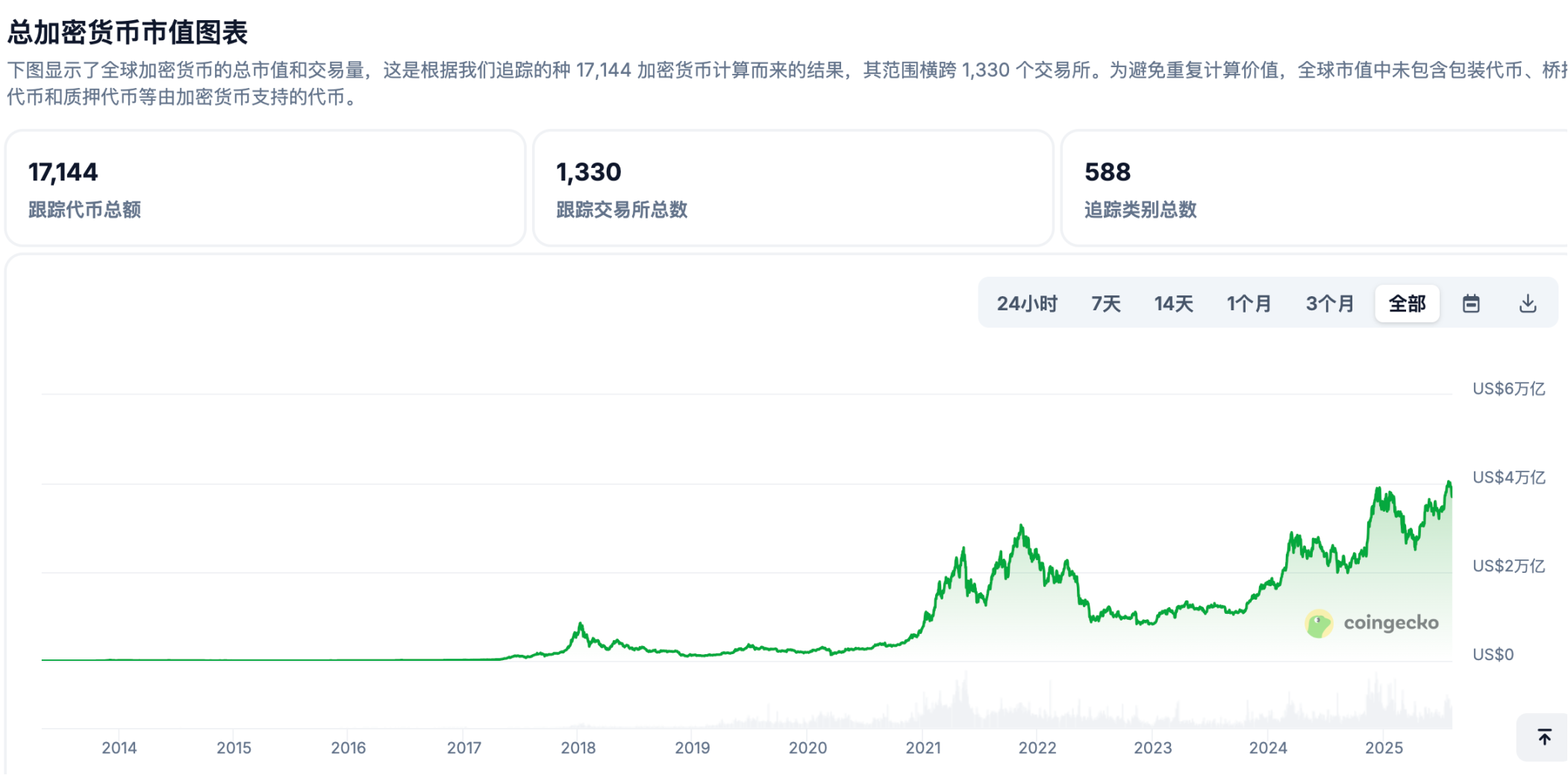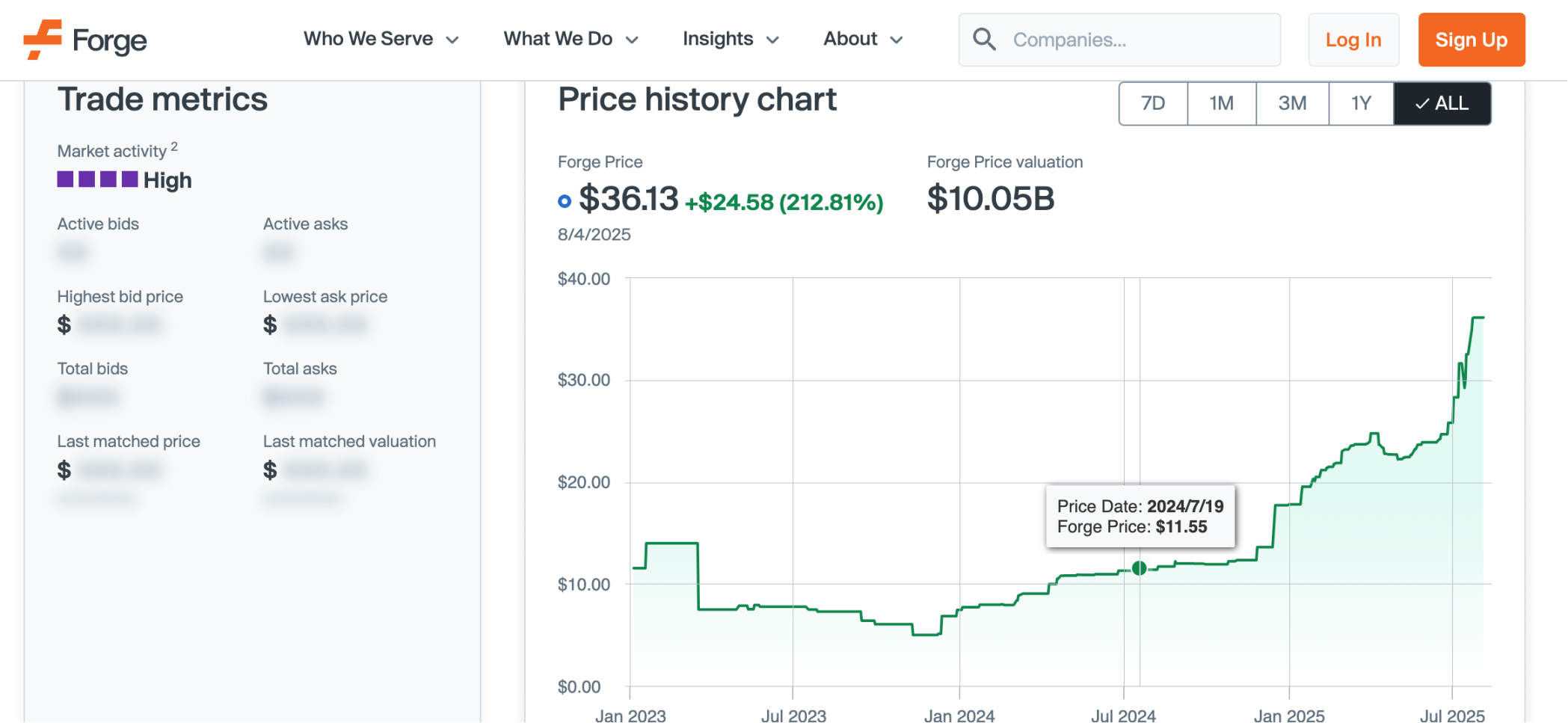Author: Bright, Foresight News
Will the Altcoin Season Come Again?
This is a question that almost all crypto players are asking. After all, during the last bull market from 2020 to 2021, very few people shouted "All in BTC," while during DeFi Summer, there were numerous altcoins that surged fivefold. The total market capitalization of cryptocurrencies skyrocketed from about $200 billion in January 2020 to slightly over $3 trillion in November 2021. It can be said that 90% of those who truly won in this bull market were supporters of altcoins.
However, the harsh reality is that new assets will certainly emerge, and the explosive altcoin season, which relies on outdated methods, is unlikely to happen under current circumstances.
The Defeated Army of Altcoins
While many are still waiting for the altcoin season, four years later, the crypto industry has quietly approached the end of the bull market. From 2024 to mid-2025, the total market capitalization of cryptocurrencies has actually grown dramatically by 130%.
On November 15, 2021, the peak price of BTC was around $69,000, and the total market capitalization of cryptocurrencies reached about $3 trillion; on July 14, 2025, the peak price of BTC was $123,091, and the total market capitalization peaked at about $3.91 trillion.
In contrast, considering the influx of junk Memecoins during the Meme craze, there are already millions of altcoins on-chain. This time, altcoins have faced a massive defeat.

In response, perhaps all that can be said is: Sorry, we failed.
The reason we cannot Make Altcoin Great Again is that the crypto industry, which has been waving the banner of compliance, is experiencing the painful process of cutting away the excesses that grew during its wild past.
Wall Street's Land Grab Game
Under the trend of crypto compliance in the United States, Wall Street's regular army, which previously dared not act recklessly, has begun to flood into the "danger zone" of cryptocurrencies during the Biden administration, simultaneously planting the colonial flag of financial hegemony on-chain.
From the player's perspective, the game structure composed of whales, retail investors, miners, and crypto institutions has vanished. Retail investors, who jokingly call themselves "Nasdaq and Dow Jones crypto traders," have genuinely become opponents of professional hedge funds on Wall Street.
From the asset perspective, the previously successful VC setups and carefully designed low liquidity, high market cap strategies are no longer viable; unregulated Meme coins continue to bleed after retail investors lost interest; DeFi also seems not to be the first choice for institutional hot money.
In fact, the wealthy institutions on Wall Street entering crypto have taken the first step by using capital power to control Bitcoin, which is factually the most "decentralized" and has the highest consensus in the crypto industry, thus gaining the power of discourse in the cryptocurrency sector, such as Grayscale's Bitcoin ETF. The second step is to extend their already controlled financial power into crypto, attracting native crypto investors to switch investment categories, such as stock tokenization and altcoin "micro-strategy" companies. The third step is to issue new crypto-related assets that comply with existing financial regulations, completely mastering the pricing power of crypto assets, such as crypto company IPOs.

The hot money that native crypto enthusiasts originally hoped for from Wall Street did not foolishly flood into the already occupied "decentralized" track. In other words, they chose to play their own game, and not only that, they want to force you to play theirs with cold hard cash.
If you can't beat them, then join them.
The Undercurrent of IPO Fever
On June 5, Circle went public on the New York Stock Exchange, with its stock price soaring over 160% on the first day, eventually reaching a high of $289.99, a staggering increase of 9.64 times from the issue price of $31. Meanwhile, cryptocurrencies can only be described as performing mediocrely.

Circle's return on investment is the authentic flavor of past altcoin seasons. Following this, a series of crypto-related companies announced plans for IPOs in the second half of 2025, including domestic exchanges like Kraken, FalconX, Gemini, and Bullish, as well as fintech companies and asset management institutions like Bitgo, Grayscale, and Figure. There were even reports of OKX planning to go public in the U.S. In addition to the bustling U.S. stock market, the South Korean exchange Bithumb announced a two-step strategy involving the Korean KOSDAQ and the U.S. Nasdaq, while the Thai exchange Bitkub stated it would list on the Thai Stock Exchange.
On July 30, it was reported that the U.S. exchange Kraken was seeking to raise about $500 million at a valuation of $15 billion, further stimulating the crypto industry.
Previously, Robinhood announced its entry into stock tokenization, even launching equity for top private companies like OpenAI and SpaceX, officially opening up the imagination for Pre-IPO. Recently, as Kraken stirred up expectations for its IPO, private equity trading platforms like Forge conveniently provided access and exit channels for those "looking to sell" and "wanting to buy early."
Generally speaking, investors can purchase equity in unlisted companies through two methods: the first is the P2P model, and the second is the SPV model. Taking Kraken as an example, the P2P model involves the platform matching sellers of Kraken equity with buyers, and the trading platform assists both parties in completing KYC, due diligence, and contract signing processes. The SPV model involves the trading platform establishing a special purpose vehicle (SPV) to pool buyer funds and collectively purchase equity in the target company.
Currently, the price on the Forge platform is $36.13, with a valuation of about $10 billion. If Kraken successfully goes public at a $15 billion valuation, current entrants may achieve over 50% excess returns.

In summary, crypto company IPOs are akin to a coming-of-age ceremony for the crypto industry. After this ceremony, it will gain widespread recognition from the world, but this also means it must shed the outdated toys of its childhood. Yes, we are talking about those garbage projects that cannot calculate price-to-earnings ratios and only know how to create PowerPoint presentations.
免责声明:本文章仅代表作者个人观点,不代表本平台的立场和观点。本文章仅供信息分享,不构成对任何人的任何投资建议。用户与作者之间的任何争议,与本平台无关。如网页中刊载的文章或图片涉及侵权,请提供相关的权利证明和身份证明发送邮件到support@aicoin.com,本平台相关工作人员将会进行核查。



